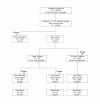The requirement for prior consent to participate on survey response rates: a population-based survey in Grampian
- PMID: 14622444
- PMCID: PMC293468
- DOI: 10.1186/1472-6963-3-21
The requirement for prior consent to participate on survey response rates: a population-based survey in Grampian
Abstract
Background: A survey was carried out in the Grampian region of Scotland with a random sample of 10,000 adults registered with a General Practitioner in Grampian. The study complied with new legislation requiring a two-stage approach to identify and recruit participants, and examined the implications of this for response rates, non-response bias and speed of response.
Methods: A two-stage survey was carried out consistent with new confidentiality guidelines. Individuals were contacted by post and asked by the Director of Public Health to consent to receive a postal or electronic questionnaire about communicating their views to the NHS. Those who consented were then sent questionnaires. Response rates at both stages were measured.
Results: 25% of people returned signed consent forms and were invited to complete questionnaires. Respondents at the consent stage were more likely to be female (odds ratio (OR) response rate of women compared to men = 1.5, 95% CI 1.4, 1.7), less likely to live in deprived postal areas (OR = 0.59, 95% CI 0.45, 0.78) and more likely to be older (OR for people born in 1930-39 compared to people born in 1970-79 = 2.82, 95% CI 2.36, 3.37). 80% of people who were invited to complete questionnaires returned them. Response rates were higher among older age groups. The overall response rate to the survey was 20%, relative to the original number approached for consent (1951/10000).
Conclusion: The requirement of a separate, prior consent stage may significantly reduce overall survey response rates and necessitate the use of substantially larger initial samples for population surveys. It may also exacerbate non-response bias with respect to demographic variables.
Figures






References
-
- McColl E, Jacoby A, Thomas L, Soutter J, Bamford C, Steen N, Thomas R, Harvey E, Garratt A, Bond J. Design and use of questionnaires: A review of best practice applicable to surveys of health service staff and patients. Health Technical Assess. 2001;5 - PubMed
-
- NHS Scotland Our National Health – A plan for action, a plan for change. 2000.
-
- Moser CA, Kalton G. Survey Methods in Social Investigation. Aldershot: Gower Publishing Company Limited; 1971.
-
- Kish L. Survey sampling. New York: John Wiley; 1965.
-
- Emslie M, Campbell M, Walker K. Complementary Therapies in a local healthcare setting. Part 1: Is there real public demand? Complementary Therapies in Medicine. 1996;4:39–42.
Publication types
MeSH terms
LinkOut - more resources
Full Text Sources

